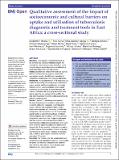Qualitative assessment of the impact of socioeconomic and cultural barriers on uptake and utilisation of tuberculosis diagnostic and treatment tools in East Africa : a cross-sectional study
Abstract
Objectives Early diagnosis and timely treatment are key elements of a successful healthcare system. We assessed the role of socioeconomic and cultural norms in accelerating or decelerating uptake and utilisation of health technologies into policy and practice. Setting Secondary and tertiary level healthcare facilities (HCFs) in three East African countries. Level of HCF was selected based on the WHO recommendation for implantation of tuberculosis (TB) molecular diagnostics. Participants Using implementation of TB diagnostics as a model, we purposively selected participants (TB patients, carers, survivors, healthcare practitioners, community members, opinion leaders and policy-makers) based on their role as stakeholders. In-depth interviews, key informant interviews and focus group discussions were held to collect the data between 2016 and 2018. The data were transcribed, translated, coded and analysed by thematic-content analysis. Results A total of 712 individuals participated in the study. Socioeconomic and cultural factors such as poverty, stigma and inadequate knowledge about causes of disease and available remedies, cultural beliefs were associated with low access and utilisation of diagnostic and treatment tools for TB. Poverty made people hesitate to seek formal healthcare resulting in delayed diagnosis and resorting to self-medication and cheap herbal alternatives. Fear of stigma made people hide their sickness and avoid reporting for follow-up treatment visits. Inadequate knowledge and beliefs were fertile ground for aggravated stigma and believing that diseases like TB are caused by spirits and thus cured by spiritual rituals or religious prayers. Cultural norms were also the basis of gender-based imbalance in accessing care, ‘I could not go to hospital without my husband’s permission’, TB survivor. Conclusion Our findings show that socioeconomic and cultural factors are substantial ‘roadblocks’ to accelerating the uptake and utilisation of diagnostic and treatment tools. Resolving these barriers should be given equal attention as is to health system barriers
Citation
Msoka , E F , Orina , F , Sanga , E , Miheso , B , Mwanyonga , S , Meme , H , Kiula , K , Liyoyo , A , Mwebaza , I , Aturinde , A , Joloba , M , Mmbaga , B T , Amukoye , E , Ntinginya , N E , Gillespie , S H & Sabiiti , W 2021 , ' Qualitative assessment of the impact of socioeconomic and cultural barriers on uptake and utilisation of tuberculosis diagnostic and treatment tools in East Africa : a cross-sectional study ' , BMJ Open , vol. 11 , no. 7 , e050911 . https://doi.org/10.1136/bmjopen-2021-050911
Publication
BMJ Open
Status
Peer reviewed
ISSN
2044-6055Type
Journal article
Description
Funding: The study was funded by the European and Developing Countries Clinical Trials Partnership (EDCTP), grant TWENDE-EDCTP-CSA-2014-283.Collections
Items in the St Andrews Research Repository are protected by copyright, with all rights reserved, unless otherwise indicated.

